Richard Bush sits down for an interview discussing how a Biden administration would impact U.S. Taiwan policy. This piece originally appeared in CommonWealth Magazine.
Our exclusive interview of former AIT Chairman Richard C. Bush, currently a nonresident senior fellow at Brookings, on how the Trump administration views Taiwan, and what a Biden presidency might mean for US-Taiwan relations.
Q: Would you define what Trump has done for Taiwan as “achievements”?
Trump’s policy has been confused or conflicted. His administration has done some good things on the diplomatic front and the security front, but it has done nothing to improve US-Taiwan economic relations. In fact, it’s gotten worse, particularly in the technology front.
Moreover, it’s pretty clear that Trump doesn’t think that Taiwan is very important. On one occasion, he’s reported to have questioned our security commitment to Taiwan. He said, What do I get from defending Taiwan? The most important word in that sentence is not “Taiwan”, but “get”. It’s a very transactional view.
I think that he is the source of greater unpredictability going forward. If Biden becomes president, I think that US policy towards Taiwan will be more stable. And I hope he can address some of Taiwan’s needs, particularly in the economic area.
Q: Top US Health official and Under Secretary Krach made an unprecedented visit to Taiwan. US Ambassador Kelly Kraft met Taiwanese officials in New York City. Do you think it means US-Taiwan relations have fundamentally changed?
No, I don’t. I think that, you know, it’s hardly unprecedented for a cabinet secretary to go to Taiwan. The first time it happened was 1991. I think that sending Secretary Azar in a way shows how the relationship between the United States and Taiwan have changed, at least in the area of public health.
It was Taiwan that did a terrific job on confronting the Coronavirus and the United States did a terrible job.
I think the Under Secretary Krach visit was one level up, and a positive symbolic response to President Tsai’s courageous decision on Ractopamine and pork. But the State Department does not dictate US trade policy towards Taiwan, the Office of the US Trade Representative does.
If Mr. Lighthizer had gone to Taiwan, that would have been significant. And the question is still open: how is this administration or the next administration going to respond to President Tsai’s removal of this obstacle? So I don’t think it’s a fundamental change. I think they’re good steps, but Taiwan shouldn’t read too much into them.
What’s important at the end of the day is the substance of a relationship and whether the United States and Taiwan can cooperate in the best possible way and whether the United States can take steps that truly strengthen Taiwan in a substantive way.
Q: Do you think the issue of BTA or FTA will be discussed after the election?
My impression is that Trump does not like to do trade agreements with countries that have trade surpluses with the United States. Taiwan has a big trade surplus with the United States. Trump does not understand that the bilateral trade balance is meaningless in terms of economic costs and benefits for the United States.
So I have no idea if Trump wins, whether Lighthizer would stay, but I’m not optimistic about the United States moving forward on a BTA if Trump wins.
Second, it’s way too early to tell what Biden would do if he became President. Before he makes a decision about economic policy towards Taiwan there would have to be discussion within his administration about trade policy in general. I do know that there’s greater support for a BTA with Taiwan in the US. I was one of the conveners for a task force on the US-Taiwan policy that just issued its report. You can find it on the website of the Center of Strategic and International Studies.
One of our leading recommendations was that the United States really strengthen its economic relations with Taiwan and take steps towards a BTA. You should be aware of a potential problem, the so-called Trade Promotion Authority under which big trade agreements are done with an up or down vote in the Congress.
If we did a BTA with Taiwan, the Trade Promotion Authority would probably have to be in place. There are different factions within the Biden camp when it comes to trade policy in general, even though people generally have a positive impression of Taiwan.
So this situation is actually very complicated. I think the desire to do something to strengthen Taiwan economically exists and is getting stronger, but the mechanics and the timing are not so clear.
Q: According to Taiwan Public Opinion Foundation’s latest poll, 38% of the Taiwanese people worry the US-Taiwan relations may get worse if Biden wins the election. Do you think it’s fair for Biden?
So does that mean that 62% of the people thought it would get better?
I think, first of all, there are some Taiwanese people who think that Republicans are good for Taiwan and Democrats are bad. I think that this is not based on fact. It’s not based on reality. What is important is whether the interests between our two countries are converging or diverging.
And they were basically converging during the Obama administration, of which Vice President Biden was a key member. For example, one of the significant new things in our relationship is the Global Cooperation Training Framework that was created with the strong support of the Obama administration.
One of the important developments in our defense relationship — the Overall Defense Project — was encouraged by the Obama administration. So Democratic administrations have been good for Taiwan, as Republican ones have.
Keep in mind that the top priority for the Biden administration is to re-strengthen the United States, to correct all the problems that have been created during the Trump administration, and to restore our leadership globally. That’s the big broad priority.
Second, we really need to restore the process that we have had in previous administrations for formulating foreign policy and national security policy that broke down. There will have to be some kind of policy review concerning East Asia in general, and China in particular.
I think that Vice President Biden and the people who will be advising him on foreign policy and national security are not naive at all about the challenge that China poses. They understand it pretty clearly. Whatever the Biden people thought 20 years ago, a lot has changed in 20 years, and they know it.
Through this interagency process, and through this policy review, I think that the administration will figure out the threat China poses. What are US priorities in dealing with that threat and that problem? How should we go about addressing various aspects of China policy? What areas should we cooperate on?
But on the Democratic side, I think that there’s a lot of understanding of Taiwan’s situation and a lot of sympathy for Taiwan, a genuine recognition that Taiwan is a strong democracy and needs to be respected for that. I think that whatever they come up with will be good for Taiwan.
Q: Do you think the US-China relations will be strategically competitive in the future no matter who wins the election?
Well, I think that it’s way too early to make any sort of prediction. There may again be areas of cooperation. But it has to be on the right terms.
Cooperation does not mean appeasement. Cooperation means where we have shared interests and converging interests. I think climate change is one of these. Before we decide what our climate policy towards China will be, we need to figure out what the climate policy for our own country should be and get that straight.
Q: For President Tsai, she seems to face the uncertain future. Do you have any advice for her to maintain the current prosperity of Taiwan and regional stability?
First of all, on the economic side, she has made a bold move with respect to ractopamine, and so now the ball is in the United States. Unfortunately, we’re at a time when we’re at the end of one administration and probably the beginning of a different administration. So it may take us a little bit of time to hit the ball back to the Taiwan side. But I think that that creates a good foundation.
President Tsai has talked about financial liberalization. That’s a good idea. but it’s complicated.
Cross-Strait tensions in the security area are not a preparation for a war. I hope there won’t be an accidental clash between a Taiwan Air Force Fighter and PLA Air Force fighter because that would create a difficult situation.
The approach that China is taking towards Taiwan right now, is neither war nor accommodation. It’s what I call coercion without violence. And the goal is to subdue without fighting, and to weaken the psychology of Taiwan people.
Q: From Biden’s ways of doing things, do you think there will be more predictability in his Taiwan policy if he wins the election?
If Biden wins, the policy will be more predictable. I think the conduct of our relationship will be more normalized. I hope that a priority of the Biden administration will be to find ways to strengthen Taiwan economically because that’s an important area.
And, you know, I don’t think that Taiwan needs to worry about the goodwill of the officials who will be working for the vice president. There’s one thing you need to remember about Vice President Biden. Vice President Biden is the only currently serving or former member of Congress who voted for the TRA and is still in public life .
The only one! He voted for the TRA. He knows what the TRA is. And I suspect that he regards that as one of the most important votes that he took in his whole congressional career.
Q: President Tsai seems to be a trustworthy partner for the Trump administration. How should she get along with the Biden administration if Biden wins the election?
We need to recall that during the last year of the Obama administration, President Tsai was essentially already Taiwan’s leader, and the interaction was very good. So it’s not that President Tsai is unfamiliar with the people who were likely to be on the Biden team.
I think that the current administration in Taiwan understands that good communication and consultation with the American administration is important. It’s very important. “No surprises” is very important.
They understand that maintaining as much convergence of national interests is a good basis for a good US- Taiwan relationship. As I suggested, our interests have been converging over the last thirty years.
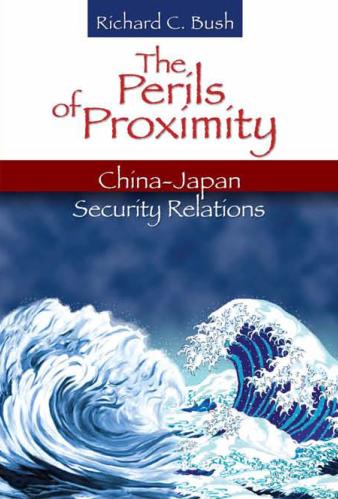
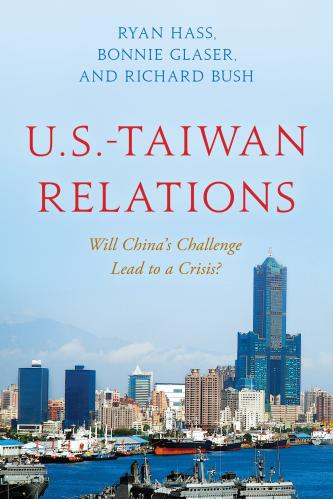
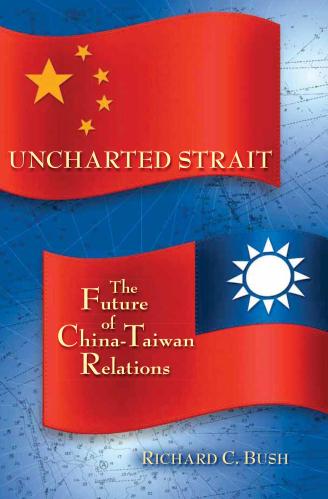
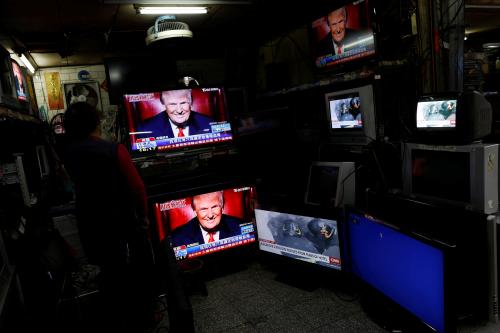
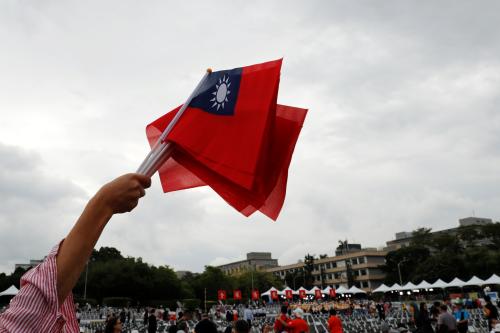
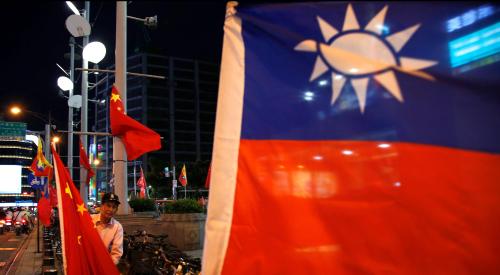



Commentary
Biden’s Taiwan policy would be more predictable
November 4, 2020